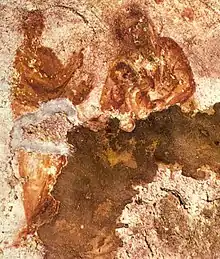
Oldest known image of Mary, mother of Jesus, here depicted nursing her son (Roman catacombs, 2nd century AD)
The Perpetual Virginity of Blessed Mary (Latin: De perpetua virginitate beatae Mariae adversus Helvidium) is an apologetic work of Saint Jerome (c. AD 342/7–420). It is an answer to Helvidius.[1]
Helvidius was the author of a work written about the year 383 against the belief in the perpetual virginity of Mary (the mother of Jesus).
Saint Jerome maintains against Helvidius three propositions:
See also
Sources
- ↑ Hunter, David G. (Spring 1993). "Helvidius, Jovinian, and the Virginity of Mary in Late Fourth-Century Rome". Journal of Early Christian Studies. Johns Hopkins University Press. 1 (1): 47–71. doi:10.1353/earl.0.0147. S2CID 170719507. Retrieved 2016-08-30.
External links
- Jerome (c. 383), "The Perpetual Virginity of Blessed Mary - Against Helvidius", in Philip Schaff; Henry Wace; Kevin Knight (eds.), Nicene and Post-Nicene Fathers, Second Series, Vol. 6, Translated by W.H. Fremantle, G. Lewis and W.G. Martley, Buffalo, New York: Christian Literature Publishing Co. (retrieved from New Advent)
- "The Perpetual Virginity of Blessed Mary Against Helvidius". clerus.org. Archived from the original on April 11, 2019. Retrieved July 18, 2022.
 The Perpetual Virginity of Blessed Mary public domain audiobook at LibriVox
The Perpetual Virginity of Blessed Mary public domain audiobook at LibriVox
This article is issued from Wikipedia. The text is licensed under Creative Commons - Attribution - Sharealike. Additional terms may apply for the media files.